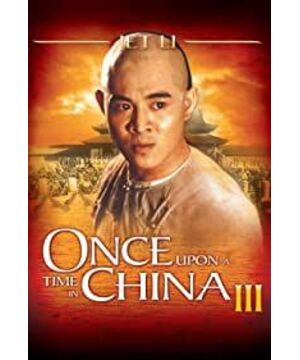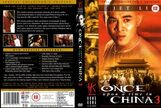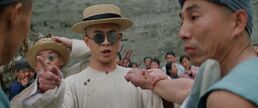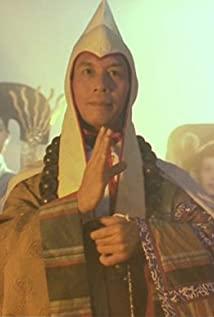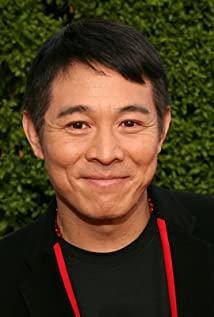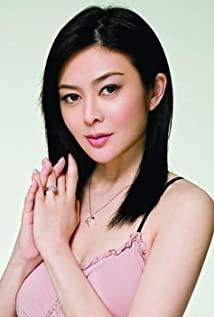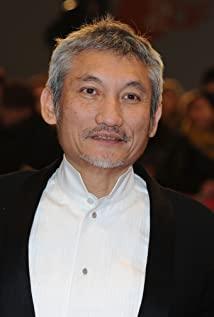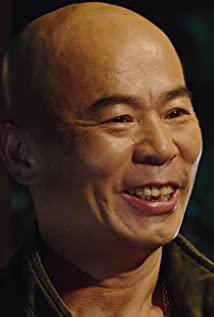Li Lianjie's version of Huang Feihong series, the Central Six sets have been released many times before, and I have watched it many times. I found the collector's edition a few days ago, and I went down and read it again. The previous impressions were all focused on boxing and kung fu. They were all poor and weak in the country, and they were bullied all over the world. When I read it again, I had many different feelings.
The first is Huang Feihong's Top Gun.
Huang Feihong, what kind of person, and what deeds are not mentioned in the movie. As soon as he came up, he took a lion dance under the guns of the American soldiers and became the leader of the militia group. A group of people practiced boxing on the beach under the background music of "Men's Self-improvement". By practicing martial arts, one can defend against the enemy and also strengthen one's body, but seeing this group of scrawny males with their upper body naked and punching, of course, my heart is agitated and high-spirited, but it is not always a good feeling. It's not the taste: use flesh and blood to deal with foreign ships and guns. Just like Master Yan who appeared later, he practiced the iron cloth shirt, but he couldn't stop the bullets fired by the opponent.
This is a kung fu film, so we must learn from martial arts; but this is not a simple kung fu film, because there are guns. In "Seven Samurai", Kuzang's swordsmanship is superb, but in the end he died under the musket and fell into the mud. Technology is advancing and the times are changing. We should not only accept the changes, but also actively learn. Huang Feihong also sneered at Western stuff at first, thinking it was useless and dangerous. But I never thought about it, why Westerners can occupy so much land in China?
Take a look at Aunt Thirteen first. She is Chinese and has lived in China since she was a child. When she grew up, she studied abroad and finally chose to return to her homeland. Her role in the film, on the one hand, revealed the embarrassing situation of such people in the social environment at that time (same as tooth brushing). Of course, foreigners look down on Asians, even if they stay and learn English, they still look down on her; Chinese people look down on her even more, saying that she is a fake foreign devil, not Chinese or foreign; another more important role is to use Huang Feihong as a teacher. Trusted people serve as an entry point, allowing Huang Feihong to get in touch with foreign gadgets and gradually change his thinking, accepting progressive Western ideas. Know that without this entry point, almost no one can adapt to change peacefully.
Master Yan from Kanto is an example of someone who cannot adapt to change peacefully. He came from the north and was a martial artist, but he had no relatives in Foshan. He lived by performing arts and could not eat a full meal. To put it simply, there is no backing with technology. In fact, it is everywhere now. In the second- and third-tier small cities in China (not to mention the more closed northeast), what is the use of ability, does it depend on relationships? Relying on the relationship to find a comfortable job in the institution, read the daily report. So many young people in small cities, even if they live in a 10-square-meter partition, take the bus and subway for two or three hours a day, and earn five or six thousand wages, they will continue to drift in Beishangguang. Why? Because Beishangguang relies on ability, and ability can break out into the world, even if it depends on relationships, it is still much better than the environment in small cities where relationships are difficult to move. Think about it, a round badge that "proves your dad is not dead" can make people hit the wall and bow their heads everywhere. It doesn't matter, there are obstacles everywhere.
But Master Yan didn't stop there. Rogues are not scary, just afraid of rogues having culture. In Huang Feihong, it becomes: hooligans are not scary, but they are afraid that hooligans can do martial arts. Master Yan originally only wanted to establish a martial arts hall to accept apprentices, but the reality overwhelmed him, even the prostitutes laughed at him "two big men drinking a bowl of soup", he decided to do whatever he could for success (he is also such a person, The knife hidden in the braid is visible, but the back has not been bent by external factors). The little leader of the Shahe Gang was really bad. He was hopelessly bad, and it was not a pity to die; but Master Yan sold his dignity because of a box of money (of course, if he succeeded later, he was called bearing humiliation) and was finally shot and killed by a row of muskets. Pity is pity, but in the end, it deserves it, and chose the wrong path. In contrast, he took refuge in the theater owner, then wanted to take Huang Feihong as his teacher, then fantasized about going to Jinshan to mine, and finally worshipped Master Yan as his teacher. Liang Kuan also went around to make a living to make a living, but in the end he could still retain his conscience. It is not easy.
Huang Feihong is a bright and promising young man. His image is not very three-dimensional, but it is very clear; everyone has their own ideas. And the masses are the same people Lu Xun wrote: they are beheaded wherever they are, and wherever there is a fight, they will flock to it. So after watching the movie, I feel very relieved, but also faintly feel very aggrieved. It's not that we were suffocated by China, which was full of barbarians in the past, but that we are suffocated now, and many things are happening again and again.
It's a kung fu film for all ages, bringing punch and comedy elements to the audience. On top of kung fu fighting, it is the history of humiliation of the country, the ignorance of the people, the foreign enemies and the internal thieves, and the punishment of traitors and evil. However, these are all thinking questions, depending on how the audience answers. What is the answer? What kind of history is it? Why does this history exist? What are the cause and effect? As one of the historical figures, at a certain historical moment, what limitations would I have? What are the different choices? How should I put myself in the country of thinking? What will happen to the people? How can I solve these problems? I have always been a person who believes in efficiency and execution. There are many problems in the world, we should solve them instead of escaping them; and the way to solve the problems, we should first face them and face them squarely. Narrow thinking doesn't really solve problems. Western thinking, there are good jade, there are rotten oranges, not to see one grab a handful, use all of them. Take the essence and get rid of the dross, that's all.
At the end of the film, Huang Feihong said: "If this world really has Jinshan, why do these foreign ships come to our port?" From this sentence, we can see that Huang Feihong knows how to adapt to changes and can think independently. I hope he is, otherwise, what is the difference between Wong Fei Hung and Master Yan? In the end, he is still a martial artist, just fighting for you, and his body is strong, but he still has a rotten head on his head.
The second part is called Wong Fei-hung's man to be self-improvement.
Compared with the complicated situation of various parties in the first part, the second part pays more attention to the ignorance of the common people.
Let’s talk about Nalan Yuanshu first. He is a typical court conservative. His surname is Nalan, he is a Manchu banner, and his net worth is not comparable to that of ordinary people. At a young age, he has great martial arts skills, and he is also a high-ranking admiral, which shows his extraordinary self-control and ambition. Can't say ambition, should say ambition. At the same time, he is also able to communicate fluently in English. Apparently, his tutor is also very good. He has studied abroad and learned Western knowledge. From several of his actions and dialogues, it can be inferred that Nalan Yuanshu supported the Qing Dynasty, which is beyond doubt. However, at that time (although the film did not clearly tell which year, there was a scene swept to the top of the church with A number, 1862, seems to be a street number or something, I guess the director wants to imply the age), Cixi has just taken power, although Nalan Yuanshu hates foreigners very much, but he still understands that the things introduced by foreigners should be put to good use. In the first act, he took the initiative to protect the telegraph house. Knowing that the West serves China, which is different from the conservatives, is commendable. Moreover, in the general environment at that time, he was able to make it clear that he would not be used by foreign enemies, and he could not point knives and guns at his compatriots, which made him even more admirable. Unfortunately, the fall of the Qing Dynasty is inevitable, not because of the analogy of the rolling wheels of history, but because the closure will definitely lead to ignorance and regression, and the death of Nalan Yuanshu is predictable. (At the beginning, Nalan Yuanshu was still thinking about driving the White Lotus cultists to the east gate and being careful to hurt innocent people. I think this is his real idea. But at the same time, I also think that as long as he feels that the situation can no longer take into account the civilians , he will also use innocent people as cannon fodder as sandbags without any scruples. He is the exact opposite of Huang Feihong's image, he is a typical self-interested person, and only when it is harmless to himself, will he be moral.)
Then talk about the White Lotus Sect. One of the slogans of the White Lotus Sect is: Help the Qing and destroy the foreign countries, so in my opinion, it is no different from the Boxers. Practice strange kung fu, rob houses, kill foreigners, and burn churches. In "Towards the Republic" Cixi said that she also knew that the Boxers were all fake tricks, but the strong men were real. If you don't make good use of it, it will turn into a flood of beasts. What Jiugong Zhenren, what Nantianmen Four King Kong, the White Lotus Sect uses the ignorance and ignorance of the people, and the humiliation and hatred brought by the foreigners after opening the door of China, turning the common people into their own weights, using them repeatedly, and acting as cannon fodder.
There is a scene in the movie where Lu Haodong and Huang Feihong saw the red-eyed believers in the Chaotian Temple of the White Lotus Sect, and sighed in despair: "We can't go! If every Chinese were like them, China There is no salvation!” Indeed, what kind of system can produce what kind of people, and what kind of people will in turn promote what kind of system. That year, Yuan Shikai proclaimed himself emperor, claiming that the Chinese people were undeveloped, and under the instigation of domestic and foreign staff, he called the emperor to save the country. It is very difficult to change people's wisdom. When a person becomes an adult, his thinking is solidified, and no one can change it. Only when the previous generation dies and the next generation gradually cultivates innovative ideas (the students of Tongwenguan), can they slowly Improve step by step. Otherwise it is impossible.
At the beginning of the film, Li Hongzhang signed the "Treaty of Shimonoseki" (wait, then the background of the film should be after 1895, so I guessed that 1862 was wrong), some patriotic scholars spontaneously organized staff to march on the streets with slogans against Li Hongzhang asked Japan for peace, and the masses said that they were "full of food and support", and some people said "don't interfere with business." It can be seen that the stupidity of the scholars and the ignorance of the common people are related to the collapse of the Qing Dynasty, and only one or two paper painters or doctors cannot save them. (I am not denying their value, on the contrary, I think that as long as everyone has a conscience and does his best, no matter how big or small, no matter how big his contribution is, it is positive energy. The promotion of social reform is brought together by these countless efforts. of.)
It is worth mentioning that the fighting in this one is better than the first one (don't you think, I think), and it is as wonderful as Fang Shiyu, who is also played by Jet Li, in the blindfolded street fight.
The third one is Wong Fei Hung: The Lion King.
Lions, there are no lions in China, nor in ancient times. They are not animals that grow on this land (but it is also possible that the lions from Africa were brought over when foreigners paid tribute). However, there is a legend of lions in ancient times. There is a legend: "Nian" is a kind of fierce beast, it looks like a lion, so every year "Nian" comes out to eat people, people set off firecrackers to scare "Nian" Walk. Maybe it's my ignorance. I always thought that lion dance is a custom in Guangdong, and there is no lion dance in the north (I later learned that there is a lion dance in the north). So when I watched this movie as a child, I always thought it was still happening in Guangzhou or Foshan (I always heard it said "Guangdong Guild Hall"), not at the feet of the emperor in Beijing.
The first Huang Feihong was in Foshan, the second he went to the provincial capital, and the third came to Beijing, all the way from south to north, revealing the various styles of the late Qing Dynasty. The villains in the first part include Master Yan, the Shahe Gang, and the British and American Empire; in the second part, the villains are the White Lotus Sect and Nalan Yuanshu; in the third part, the villains are the Russians and the evil young master Zhao Tianba. The Russians didn't say much, but they assassinated in order to compete with the Japanese for land. Zhao Tianba, surnamed Zhao, is different from the villains in the first two films. He does not have the same kung fu as Huang Feihong. He relies on the crowd and does all kinds of evil: sabotage, robbing women, setting traps, and killing people indiscriminately. Zhao Tianba's performance is really amazing, more dazzling than the first two Huang Feihong, as well as the villains in Su Qier and Fang Shiyu. He has some martial arts, but he is not very powerful; he is at the feet of the emperor, but he can still be arrogant and domineering; Routines, other people's words, turning faces faster than turning books, and using strong words to frame things smoothly; especially the vivid face of the villain, which interprets the arrogance, oily, abhorrent and disgusting to the extreme. He spat. In particular, Zhao Tianba's ability to spit lotus flowers is completely different from Master Yan's Nalan Yuanshu. It cannot fully reflect the richness of the words used by the evil young master Zhao Tianba in the capital. (Must listen to the Mandarin dubbed version)
Let's talk about Ghost Feet Seven. He was originally a capable thug under Zhao Tianba, and he was quite arrogant himself. It was only after the serious injury that I realized that the world was cold and human beings were warm and cold. Not to mention Zhao Tianba, even his little minions kicked and punched him. What about normal times? "Seven brothers and seven masters" do not know how kindly they are called. Inadvertently rescued by Huang Feihong, and moved by the sincerity of everyone in the Guangdong Association. In the world, is there a more moving story than abandoning evil for good and the prodigal son? It was raining heavily outside, and Aunt Thirteen came to hold an umbrella for him; Huang Feihong came to help him, but he was slapped a few times. This reminds me of what the Bible says, "Love your neighbor. When someone hits you on the left cheek, stick your right cheek." I'm not religious, but this sentence pops up at this moment. , shown incisively and vividly in Huang Feihong.
Love is harder than hate!
Love is more powerful than hate!
In the first part, I said, "Huang Feihong, what kind of person is he, and what are the deeds," the movie did not say. In the third Lion King, Huang Qiying, Huang Feihong's father, suddenly appeared. It is said in the Three Character Classic that the fault of not raising the godfather, from the characteristics of Huang Feihong's movie characters, can see a little bit of Huang Qiying's family education. Huang Feihong's righteousness comes from Huang Qiying's righteousness; Huang Feihong's enlightenment benefits from Huang Qiying's enlightenment. "I think those old lion heads are all tossed away. Things that are outdated should not be kept." Huang Qiying was talking about the old lion heads, referring to the old concept, which is evident. Speaking of the old lion heads, there is a scene where Huang Qiying took Thirteen Aunts to look at the old lion heads and said, "For these lion heads, they all make a name for themselves. The picture is a name." It was very pertinent. Just at this moment, the piled up old lion heads seemed to move, as if they were about to fall, but they did not. It was as if the narrator was saying: Look, they didn't want to stop even after they died.
Steam trains, steam engines, the products of Western civilization, are not only not accepted in China, but must be demolished. I quote directly from "A Brief History of Mankind":
"Why Europe? ...
Before 1850, the technological gap between Eurasian and African countries was negligible... Why did Europeans allow themselves to widen such a large gap with the rest of the world in the next century? … The technology of the first industrialization was relatively uncomplicated. Is it really that difficult for China or Ottoman Turkey to design steam engines, make machine guns, and lay down railways? …
By 1850, there were nearly 40,000 kilometers of railways crisscrossing the Western countries, but in the whole of Asia, Africa and Latin America, the total length of railways was only 4,000 kilometers. In 1880, the length of Western railways exceeded 350,000 kilometers... China did not build its first railway until 1876, with a total length of 25 kilometers. It was built by Europeans; it was demolished by the Chinese government the following year. Even in 1880, China, a huge empire, did not even have a railway. …
China and Persia did not lack the technology to make steam engines (copying or buying was not a problem at the time), what was lacking were Western values, stories, judicial systems and socio-political structures that took centuries to form and mature in the West, Even if you want to copy it, you can't internalize it overnight... What potential did Europe cultivate in the early modern era? …
There are two mutually reinforcing answers to this question: modern science and capitalism. "
In comparison, I agree with Gu Zhun more, his research is more profound and transparent. In "From Idealism to Empiricism" he wrote:
"Science and democracy are imported products. Chinese traditional thinking cannot produce science and democracy."
"Law in Chinese history is the weapon used by the Ming emperor to govern the world. Law is first and foremost associated with punishment, not power. However, in Roman law, which takes the spirit of Greek law, and European law, which inherits the tradition of Roman law, law is first and foremost in harmony with power. Powers are linked together. Problems like China are solved by simple 16 words, that is, the so-called: Under the whole world, is it the king who leads the land and the coast is the king's minister."
"We have some people who talk about how China can also naturally grow capitalism from within, forgetting that capitalism is not purely an economic phenomenon, it is also a legal system. The legal system is the superstructure. It is not just the economy. The foundation determines the superstructure, and what kind of economic structure can the superstructure grow or not produce. It is no accident that capitalism emerged from Greek and Roman civilizations, and neither India, China, Persia, Arab Orthodox civilizations produced capitalism. of."
In the three Wong Fei-hung films, the director has many small details, such as shadows. Obviously, it can represent the implicit introvertedness of the Chinese people, but what the implication is, you need to ask the director again. In addition, I watched the 111-minute version. There are many scenes in the second half of the movie that are very abrupt. It feels like it was cut alive and cut. I don't know what the plot of the full version has?
At the end of the third part, there is a classic line, which is specially posted:
(Mandarin version)
Mr. Li, the so-called winner is the king and the loser is the bandit. The sky cannon rang just now. If there is no sky lantern to block the gun, no one really knows who wins or loses. Now that the gold medal is in my hands, Huang, it is not that I have won. In this lion king competition organized by the adults to show the power of our people, so many people were killed and injured. In front of the world, we all lost. From the point of view of the common people, we not only need to practice martial arts to strengthen our bodies to fight against foreign enemies, but the most important thing is to broaden the wisdom of the people and integrate wisdom and martial arts. Just a brand, whether it can change the national fortune, please think twice, Mr. Li, this gold medal is reserved for you as a souvenir!
(Cantonese version)
My lord, the so-called winner is the king and the loser is the bandit, but the firecrackers went off just now. If there is no sky lantern to block the musket, who will win or lose is another matter. Now the gold medal is in my hands, Huang Feihong, but in the end, who will win Whoever loses, in fact, in this battle for the lion king, so many people were killed and injured in our martial arts world, and we all lost. The so-called brave man has no fear and benevolence is invincible. The most important thing is to practice martial arts to strengthen the body. The most important thing is the unity of wisdom and martial arts. How much is the price of a Lion King gold medal? Please think twice about this, I will give you this gold medal as a souvenir!
The Cantonese version of the lines, from the tone, the speaker is more independent and more self-respecting, and it is speaking standing up, not kneeling. Not a "minor", a "Huang", a "Mr. Li you". The third Lion King's hegemony, I think Zhao Tianba's lines in the Mandarin version are so wonderful that he can't bear to discard them, and the Cantonese version of Wong Fei-hung's lines can show his self-esteem and self-love even more, and it cannot be simply ignored.
Therefore, it is best to watch the dubbing of the Mandarin version and the subtitles of the Cantonese version.
View more about Once Upon a Time in China III reviews


